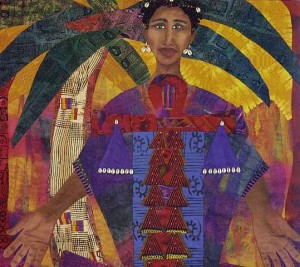“Deborah Under the Palm Tree” by Adriene Cruz. http://www.adrienecruz.com/
This is a reminder of Exponent II’s Winter Issue short story contest of Mormon feminist midrash. Midrash is a Jewish tradition of spinning out a new story based on scripture, filling in narrative gaps or retelling the scripture from a new point of view. Stories can help resolve tension or evoke questions as they ask the reader to consider possible meanings, even as the fictionalized accounts are not meant to be taken literally.
For our short story contest, we are inviting writers to tell us the missing stories of women from the scriptures. Give us the perspective of Deborah, Huldah, Dinah, Miriam, the woman at the well, Mary Magdalene, Sariah, Laman’s wife, or Emma Smith. We want to hear their voices. We want to know how they came to hear the voice of God and how they made choices in their lives. What were their childhoods like? How were they personally influenced by the great and terrible things that happened to them in the scripture stories? What did they think about in private moments? Let your imagination reveal new interpretations and meanings of scriptural stories and help us to hear the women of the scriptures.
Many of the stories we receive will be printed in our Winter 2015 issue of Exponent II and the winner of the contest will receive $150. Submissions should be between 800-3000 words and the deadline is November 2. Please send them to https://exponentii.org/wp-content/uploads/2021/12/[email protected]. We look forward to reading your stories.
“I want midrash to give a voice to women in the Bible who have had nearly none. To be an advocate for biblical figures over whom the ages have kicked considerable dust, and to imagine their lives.”
– Rosen, Norma. Biblical Women Unbound: Counter-Tales. Philadelphia: Jewish Publication Society, 1996.





3 Responses
Know it wasn’t intentional, but this is cultural appropriation. You are doing storytelling, not midrash, which is not traditionally your tradition to use freely. Use of the word midrash is the most problematic part.
[…] Exponent II’s Winter Issue short story contest of Mormon feminist midrash. Midrash is a Jewish tradition of spinning out a new story based on scripture, filling in narrative […]
We might call this “scripture fan fiction”